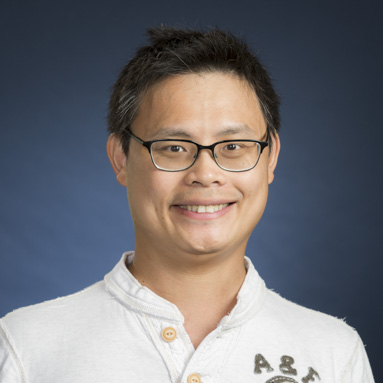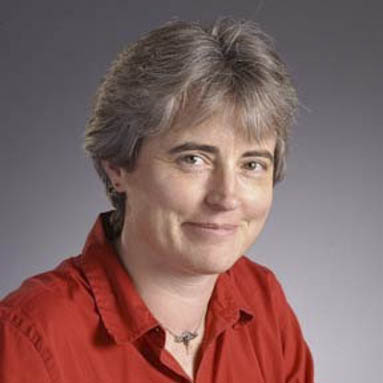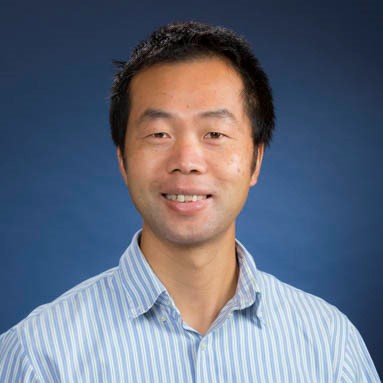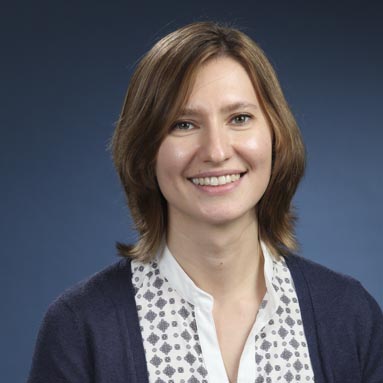The PhD in Physics program at WPI covers the full spectrum of research in the field with particular emphasis on Biophysics and Nanoscience. You’ll be well positioned to lead transformative research in our state-of-the-art labs.
Working collaboratively with world-renowned faculty and in small research groups, you’re part of the research fabric of the university. As a candidate pursuing a PhD in physics, you may choose to participate on outstanding faculty research projects such as light scattering, nanomechanics, liquid crystals, fiber optics, biophysics, order-disorder phenomena, and quantum computers.

Curriculum
Candidates pursuing a PhD in physics have the flexibility to work collaboratively on innovative faculty research endeavors and with colleagues from mathematics, computer science, or in the life sciences, but they can also develop their own tailored research approach in an area they are passionate about.
Requirements include approved courses like Classical Mechanics, Quantum Mechanics, and Advanced Electromagnetic Theory, and dissertation research, completion, and defense of the PhD thesis. PhD candidates will complete a one-year residency on campus.
We offer candidates more information about application specifics or available financial support.
Research for PhD in Physics
You’ll find significant opportunities for applied learning as your research immerses you in a stimulating collaborative community of fellow researchers and engaged faculty focused on real-world problems in medicine and health, the environment, and national defense.
Recent faculty and student research projects:
- The mechanical properties of materials at the nanoscale
- Experimental studies of liquid crystal and protein interactions
- Geometric proofs of the Kochen-Specker theorem
- A nonlinear elliptical problem for solid oxide fuel cell electrodes

State-of-the-art facilities across the campus include the WPI Life Sciences & Bioengineering Center at Gateway Park, and labs such as the Atomic Force Microscopy (AFM Laboratory) and the Center for Computational Nanoscience with Computer Clusters.

With specific strengths in the areas of biophysics and nanoscience, WPI’s physics program offers research opportunities that address areas from healthcare to lasers for missile avoidance systems.

The interdisciplinary approach to physics at WPI gives students opportunities to broaden their research and, therefore, have a wider impact with their work.

Physics presents opportunities for inspiring careers in areas including the environment, medicine, health, and national defense.

State-of-the-art facilities across the campus include the WPI Life Sciences & Bioengineering Center at Gateway Park, and labs such as the Atomic Force Microscopy (AFM Laboratory) and the Center for Computational Nanoscience with Computer Clusters.

With specific strengths in the areas of biophysics and nanoscience, WPI’s physics program offers research opportunities that address areas from healthcare to lasers for missile avoidance systems.

The interdisciplinary approach to physics at WPI gives students opportunities to broaden their research and, therefore, have a wider impact with their work.

Physics presents opportunities for inspiring careers in areas including the environment, medicine, health, and national defense.

State-of-the-art facilities across the campus include the WPI Life Sciences & Bioengineering Center at Gateway Park, and labs such as the Atomic Force Microscopy (AFM Laboratory) and the Center for Computational Nanoscience with Computer Clusters.
Physics labs at WPI use the latest, up-to-date equipment to advance researchers’ efforts. The IPG Photonics Laboratory, Atomic Force Microscopy Laboratory, and the Center for Computational Nanoscience have collaborative lab space to make groundbreaking discoveries. You’ll have access to instruments like fiber optical tweezers, traction force microscopy, and atomic force microscopy.
Faculty Profiles

Dr. Wu is an active researcher with a focus on soft matter and biophysics, which is an interdisciplinary field that encompasses physics, biology, and engineering. His work centers on the study of active fluids, which are a class of soft materials that comprise self-propelling particles capable of generating their own motion without the need for external forces or energy sources. Dr.

In my 25 plus years at WPI, I have been actively engaged in teaching and research at a variety of levels. Our Projects Program is the place where these two activities naturally come together, and the Major Qualifying Projects (or senior theses) I have guided over the years have been among my most rewarding experiences. In the mid 1990s, I became interested in the field of Quantum Information Science, whose goal is to store information in quantum objects, such as single atoms or photons, and explore ways in which it can be harnessed to perform tasks beyond the scope of today’s computers.

Nancy Burnham graduated from the University of Colorado at Boulder in 1987 with a Ph.D. in Physics. Her dissertation concerned the surface analysis of photovoltaic materials. As a National Research Council Postdoctoral Fellow at the Naval Research Laboratory, she became interested in scanning probe microscopy, in particular its application to detecting material properties at the nanoscale.

I perform experimental and computational (Monte Carlo) research in the field of applied nuclear physics with a focus on Medical and Health Physics. Presently my research group is investigating: 1) developing a unique technique to enable ultrahigh-resolution in-vivo functional imaging using neutrons,
2) adapting Gen. IV micro-reactors as the core of a next generation research nuclear reactor which also can supply carbon-free energy to a campus,
3) developing a 169Yb brachytherapy source to enable localized intensity-modulated radiation therapy, and,

For me, Physics is like a sandbox. It gives me the opportunity to play and discover, test, be creative, learn something new. At the same time, I am passionate about passing the thrill of discovery to my students. Teaching is a two-way street in which both parties get enriched from each other. I welcome and embrace the partnership. I also believe that college is the biggest and best opportunity in one's life to discover one's calling and do something about it and I invite students to take full advantage of it.

Professor Wen is an experimental biophysicist who is interested in applying physical methods to understand biological phenomena. By measuring the mechanical properties of living cells and the mechanical interaction between cells and ECM, he aims to understand how cells convert external mechanical signals to internal biochemical signals that govern cellular function, including cell morphology, migration, and differentiation. His research will help to design novel materials for wound healing, tissue engineering, and tumor treatment.

Dr. Wu is an active researcher with a focus on soft matter and biophysics, which is an interdisciplinary field that encompasses physics, biology, and engineering. His work centers on the study of active fluids, which are a class of soft materials that comprise self-propelling particles capable of generating their own motion without the need for external forces or energy sources. Dr.

In my 25 plus years at WPI, I have been actively engaged in teaching and research at a variety of levels. Our Projects Program is the place where these two activities naturally come together, and the Major Qualifying Projects (or senior theses) I have guided over the years have been among my most rewarding experiences. In the mid 1990s, I became interested in the field of Quantum Information Science, whose goal is to store information in quantum objects, such as single atoms or photons, and explore ways in which it can be harnessed to perform tasks beyond the scope of today’s computers.

Nancy Burnham graduated from the University of Colorado at Boulder in 1987 with a Ph.D. in Physics. Her dissertation concerned the surface analysis of photovoltaic materials. As a National Research Council Postdoctoral Fellow at the Naval Research Laboratory, she became interested in scanning probe microscopy, in particular its application to detecting material properties at the nanoscale.

I perform experimental and computational (Monte Carlo) research in the field of applied nuclear physics with a focus on Medical and Health Physics. Presently my research group is investigating: 1) developing a unique technique to enable ultrahigh-resolution in-vivo functional imaging using neutrons,
2) adapting Gen. IV micro-reactors as the core of a next generation research nuclear reactor which also can supply carbon-free energy to a campus,
3) developing a 169Yb brachytherapy source to enable localized intensity-modulated radiation therapy, and,

For me, Physics is like a sandbox. It gives me the opportunity to play and discover, test, be creative, learn something new. At the same time, I am passionate about passing the thrill of discovery to my students. Teaching is a two-way street in which both parties get enriched from each other. I welcome and embrace the partnership. I also believe that college is the biggest and best opportunity in one's life to discover one's calling and do something about it and I invite students to take full advantage of it.

Professor Wen is an experimental biophysicist who is interested in applying physical methods to understand biological phenomena. By measuring the mechanical properties of living cells and the mechanical interaction between cells and ECM, he aims to understand how cells convert external mechanical signals to internal biochemical signals that govern cellular function, including cell morphology, migration, and differentiation. His research will help to design novel materials for wound healing, tissue engineering, and tumor treatment.

Dr. Wu is an active researcher with a focus on soft matter and biophysics, which is an interdisciplinary field that encompasses physics, biology, and engineering. His work centers on the study of active fluids, which are a class of soft materials that comprise self-propelling particles capable of generating their own motion without the need for external forces or energy sources. Dr.
Have questions?
WPI's dedicated graduate student support team can help.
Refer a Friend
Do you have a friend, colleague, or family member who might be interested in a WPI graduate program? Click below to tell them about our programs.
Earn a PhD in Applied Physics Instead
Are you interested in taking a multidisciplinary approach to physics? Open your career possibilities and use a combination of practical and applied physics, mathematics theories, and engineering principles with our PhD in applied physics. The applied physics PhD program gives students the in-depth exposure to active projects that lead to big contributions in the field. Do you first need to earn your master’s in applied physics? Learn how to create new breakthroughs and make real impact on the world with a master’s in applied physics at WPI. Maybe you’re interested in a traditional physics pathway? Explore our master’s in physics which combines theoretical knowledge of physics principles with cutting-edge research.
Make Groundbreaking Discoveries Now
Are you ready to make new explorations and contribute new, groundbreaking advances in the field? Maybe you have specific questions like is a physics PhD worth it or what does a PhD in physics do. Perhaps you’re curious about how long a PhD takes or the salary outcomes or how long does it take to get a PhD in physics. Better yet, what types of jobs with a physics PhD can you expect? Explore our career outlook for physics where you’ll find answers to all of your important questions or get in touch with us. WPI physics graduates have obtained jobs at companies like Google, Raytheon Company, and even BAE Systems. Open your career possibilities and build your network by pursuing a PhD at WPI.
Just Starting Your Academic Path? Look at WPI’s Physics Bachelor’s Degree
Are you thinking about pursuing a career in the physics industry and want to gain an understanding of physics principles? Our degree in physics applies physics principles with engineering problems so students can gain hands-on experience. You’ll have the option to focus on specific areas like nanoscience or biophysics and solve real-world scientific problems. Maybe you’re more intrigued by combining physics and math theories with engineering design and applying it to real-world problems? Our degree in applied physics blends physics, engineering, and mathematics so students can apply theories to practical devices and systems.
Expand Your Understanding of Physics and Related Fields
If you’re just starting to think about how physics might help you in the future, WPI has many options to explore this most fundamental science. If your designated major is in another field, but you realize a foundation in physics will help your academic path, a minor in physics provides a good foundation. With a minor in physics, you’ll sharpen your critical thinking while also gaining a wider perspective on problems. On a more targeted level, your interests may lead you to a minor in nanoscience. This minor gives you opportunities to study how devices, materials, molecules, and living matter all behave on the most minute level. As with the study of physics in general, this minor gives you knowledge you’ll apply to almost any field. Are you more of a space fan? WPI’s minor in astrophysics lets you study all the physics behind celestial properties from space travel to the structures of space itself or even the varying environments on planets. Your new knowledge about astrophysics can be used in many fields and career paths, but you’ll also gain a new appreciation for your understanding of the night sky. Is your science or engineering track leading you to nuclear science? WPI’s certificate in nuclear science & engineering prepares you for a range of jobs that touch on nuclear science. You’ll find this certificate imparts knowledge you can apply to industry, research, academia, or health care.
Are You a Physics Educator Looking for a Program to Match Your Goals?
Physics educators find their needs for a master’s degree are specific and targeted to education goals in their classrooms. If you’re a physics educator and ready to earn an advanced degree, WPI’s Physics for Educators master’s degree (MPED) will jump start your excitement for physics again and reenergize your teaching plans. If you’re simply looking for a way to improve your skills and get your students excited about new concepts, experiments, and discussions, this master’s degree program is going to bring your lesson plans to life and make even the more advanced physics concepts more accessible. You’ll find a new joy in physics and will be able to use what you’ve learned in the program and pass that excitement to your students.
WPI is proud to be the recipient of not one, but two National Science Foundation Research Traineeship programs. The programs provide exceptionally talented graduate students with specialized training and funding assistance to join careers at the forefront of technology and innovation. The programs are for graduate students in research-based master's and doctoral degree programs in STEM.
The BioPoint Program for Graduate Students has been designed to complement traditional training in bioscience, digital and engineering fields. Students accepted into one of the home BioPoint programs will have the flexibility to select research advisors and take electives in other departments to broaden their skills. BioPoint curriculum is designed to be individual, interactive, project-focused and diverse, and includes innovative courses, seminars, journal clubs and industrial-based projects. Learn more.
